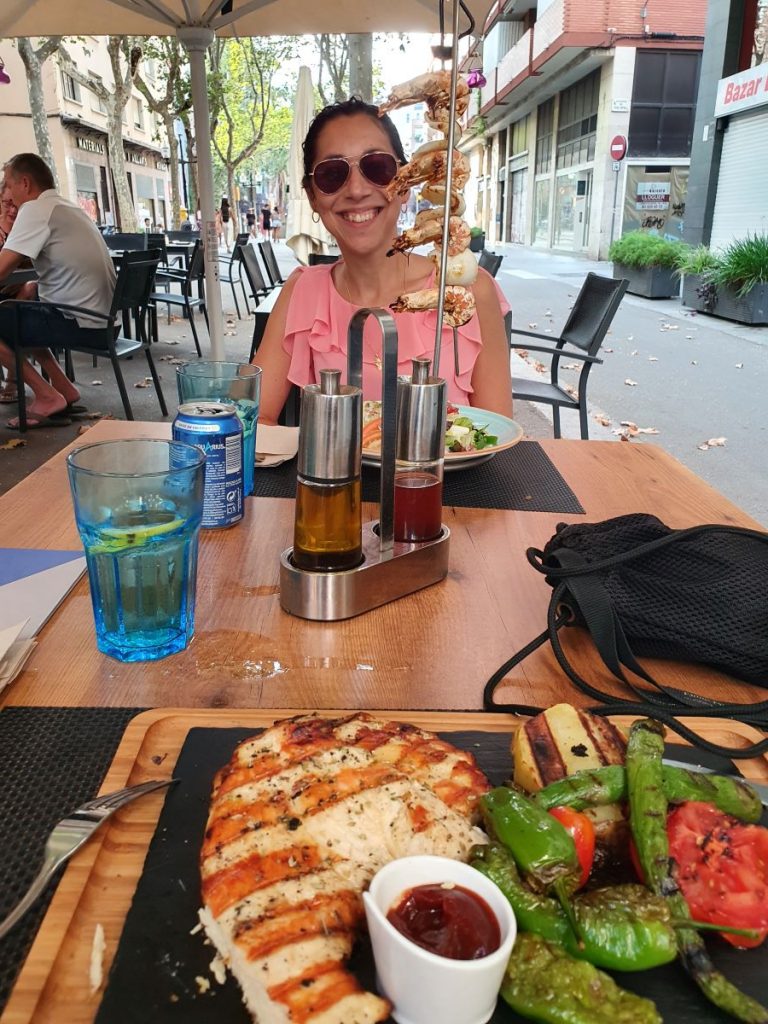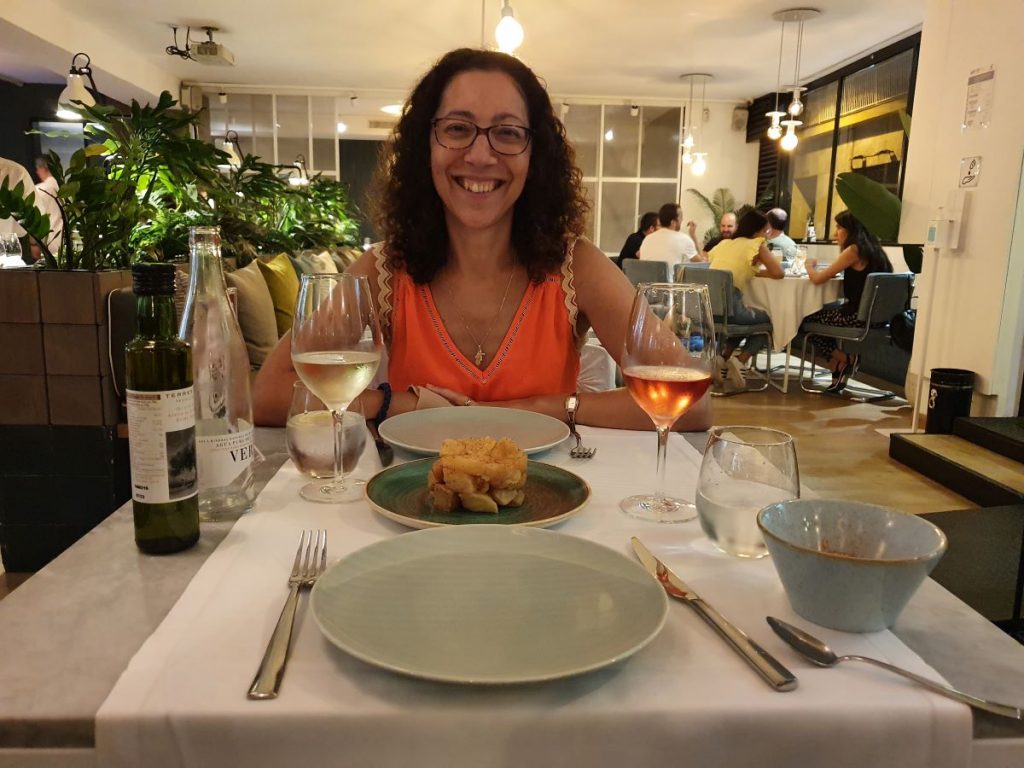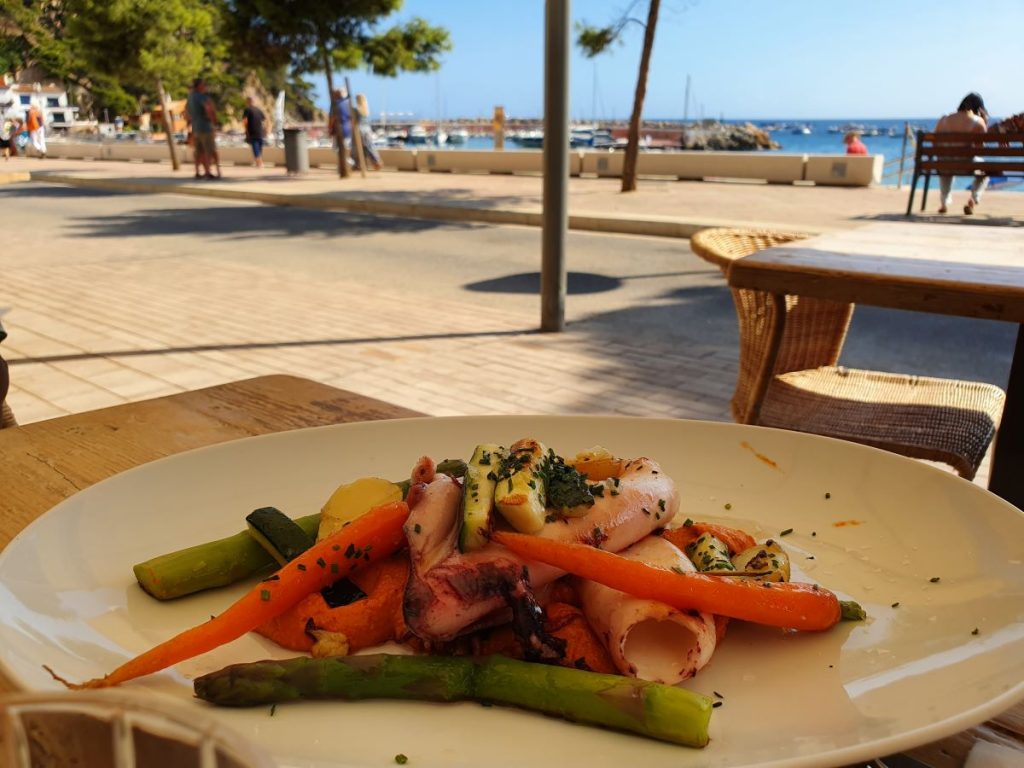|
Audio Version
Getting your Trinity Audio player ready...
|
We’re often told that being vegan is the panacea, the sustainable solution to all of our health and environmental problems. Many environmentalists have already switched to a vegan diet. But is it suitable for everyone to completely ditch animal products? And is it really the most sustainable way to eat in order to reduce our carbon emissions?
Following the first article about how some environmentalists dare to travel while they are supposed to care for the planet, I am now discussing how the way we eat, the way we shop for food, and our diet impact the environment.
Pure environmentalists often accuse people who care for our planet of cognitive dissonance depending on their diet.
Can you be an environmentalist and not vegan?
So you’re an ecologist, but not a vegan? How dare you?! That’s what I hear all the time from perfectionists.
Even some vegans start to understand that being so obsessive may actually alienate people from joining their movement.
Veganism: not a diet for everyone
There was a time I thought being a vegan was the most sustainable and important gesture to save lives and the planet and that I had to try it if I wanted to live up to my values.
There’s about 10% of the population suffering from IBS, digestive or other chronic inflammatory intestine-related ailments. For some of them, a diet rich in fibre is excellent. The more fruits and vegetables they have, the better they feel.
For others, it’s the exact opposite. The more vegetables and fruits they have, the worse they get.
And there are those who have varying symptoms, where they may tolerate vegetables one day, and should absolutely avoid them the next day, and only have animal proteins to get better…
Even if people suffer from the same condition, it can manifest in very different ways.
That’s something that many health disorders have in common. We have discussed that counterintuitive fact during our interview with the ladies who live in Barcelona with a rare condition called EDS.
Food allergies and intolerances
I was kind of desperate to make my vegan diet work because of my environmental convictions. I asked the help of several health professionals (nutritionists, naturopaths, doctors). All told me I couldn’t function on a 100% vegan diet, even though one of them is herself a vegan… My body can’t tolerate most plant-based proteins. I have fructose intolerance and can’t digest many vegetables. What I need is a low FODMAP diet that includes animal-based products to better manage my chronic illness.
And this isn’t only me… There are millions of people who care for animal welfare, land and the environment who are unable to function on a vegan diet. Many have tried for years and eventually gave up because of health-related issues. I have spoken to so many people in this situation… Does it make them environmentalist hypocrites?
There’s also a huge problem in the pure vegan community: the guilt that is induced in those of us who can’t function on a vegan diet. It’s always our fault, we didn’t try hard enough, we just implemented it the wrong way, we didn’t get the right professional to guide us, etc.
With my condition, I am constantly in touch with health professionals and doctors. I even went to private ones who are some of the best, in Paris, Barcelona, and Toulouse, some of them vegan or ex-vegans. At the end of the day, every body is different. We should stop the guilt and do what’s best for our bodies and health.
The IPCC report says we should eat less meat to mitigate climate change. Many vegans use those recommendations to say we should all go vegan to be sustainable and save the planet. Unfortunately, there is never one simple solution to a complex problem. And if you read the IPCC report, it doesn’t exclude meat :
‘Sustainable healthy diets’ promote all dimensions of individuals’ health and wellbeing; have low environmental pressure and impact; are accessible, affordable, safe and equitable; and are culturally acceptable, as described in FAO and WHO. The related concept of balanced diets refers to diets that feature plant-based foods, such as those based on coarse grains, legumes, fruits and vegetables, nuts and seeds, and animal-sourced food produced in resilient, sustainable and low-GHG emission systems, as described in SRCCL.
IPCC – Climate Change 2022: Mitigation of Climate Change – Summary for Policymakers
Soy: a healthy substitute protein?
When you have an intolerance to FODMAPs and beans, you think of soy as a good substitute for proteins. However, too much of it isn’t good for everyone either.
In my case, I realised after a trip to Japan that soy can make me sick if I take too much of it. After discussing with a naturopath in France, he figured out through his own experience as a vegan and through the hundreds of patients he attended throughout his career that soy wasn’t something for everyone either. It depends on genetics, habits, and external factors as well. Some people will thrive with it, others will get sick. Some will even have soy allergies, no matter how organic or fermented they are…
What if veganism was not the best solution for the planet?
After getting informed through books, videos and articles on the topic, I realised that giving up meat completely will save neither the animals nor the planet.
The way we grow food and care for animals matters more than what we eat.
I’ve learnt from regenerative specialists in agriculture that 60% of the biomass lives in the soils and what kills them the most are pesticides, chemical fertilisers, and ploughing.
Regenerative agriculture: a more sustainable solution than being vegan?
Animals raised in moving pastures are actually protecting the land from erosion and enriching biodiversity. It could be a solution to our carbon footprint as a healthy soil can stock carbon.
If we completely stop working together with animals as the pure vegans suggest, we need to rely exclusively on machines and fossil fuels. Is that sustainable?
If we buy from local farmers, as Nuría was explaining in this video about the causes around the loss of biodiversity, we actually help them not be swallowed by the monsters of monocultures and intensive farming businesses who abuse animals and the land.
Vegetarian or flexitarian: two other sustainable options apart from being vegan.
Too much meat is good for nobody.
I know many people who have drastically reduced their meat and egg intake and taken smaller steps. In many cases, it is healthy to replace cow milk with vegetable options like oat or rice drinks, and have low-fat coconut-based yoghourts.
Some kinds of dairy can be very healthy, like some types of cheese or goat kefir.
Other vegan options with similar benefits exist, like kombucha. But for some people, kefir works best.

People who care for the environment will take extra steps to make sure the dairy products they buy have as little impact as possible. For example, they buy organic and locally made, and always look at how animals are raised.
However, it’s never enough for the pure environmentalist.
The problem is like the one of the travelling environmentalist… If everyone was eating organic animal products, there wouldn’t be enough of it, because we are 7 billion people on this planet… However, this is just a hypothetical and oversimplified calculation that doesn’t take into consideration factors such as geographical factors, personal tastes or genetics.
But that’s how an environmentalist at heart who eats meat ends up being labelled as a hypocrite again. No matter how hard she or he tries to not buy meat from intensive farming.
Many environmentalists understand the notion of quality versus quantity. They eat less but better quality, because – again – it’s a question of balance and health.
Carbon footprint and climate change:
It always comes to that when you are a pure environmentalist: our individual carbon footprint. Although I will explain in a next article that this concept has actually been invented by the worst polluting industries on the planet…
In any case, I have calculated different carbon footprints from official sources. Surprisingly, there was not a big difference between a flexitarian and a vegan diet.
So, to the many vegans I came across who insult us, stop… I’m glad you’re doing your part, and I support your diet if it suits you. You’ve helped us consume less meat, and for that I’m grateful. But accept that some people can’t be 100% vegan, and they are not necessarily monsters or environmental hypocrites.
Does a true environmentalist have to eat organic food all the time?
I’m sorry for the animals dying because of chemicals, or the risks we take for our health…
Unfortunately, we can’t ignore that many people can’t afford it. In my case, my chronic illness has caused me some financial setbacks, so I can’t always buy organic, although I always think of quality over quantity.
However, if you can afford it, you should definitely prioritise and buy from regenerative or permaculture agriculture, which is even better than organic. In my research, this is the most important eco-friendly gesture! The soils have a great capacity to absorb CO2 emissions, if it’s alive and not dead in chemical monocultures like we are doing at the moment…
And, if combined with rotating animal pastures, it enriches the soils and helps in terms of erosion, avoiding droughts, wildfires, and floodings.
Stopping the pesticide and GMO industries like Bayer Monsanto and their supporters like Bill Gates is crucial for a better planet.
However, I must admit that it is very difficult to find this kind of food. And that’s one of the main reasons why I have created the Planeta Sana Address Book. If we spend our money on this kind of food, we support local farmers who are helping restore our soils, stock carbon and protect biodiversity. So don’t hesitate to share any good address of a local farmer or a shop you know where you can buy this kind of food.
What else can we do as people who care for the environment regarding what we eat?
Eat local food
So you can’t afford to buy organic food? In this case, go to your local market and get local food. Transport is one of the main contributors to climate change because most of the transportation of our food is done on the road, so it uses a lot of fossil fuels. If you can at least buy from your region, then you reduce your carbon footprint.
When you go to a restaurant, try to choose one that prioritises local food too.
And if you have the chance to have a garden or some space to grow your own food, even better!
Eat foods that are in season
When we eat foods that are not in season, chances are they come from very far away, have used packaging, or a lot of energy to conserve them (fridges, freezers, greenhouses..).
An additional health benefit of eating seasonal food is that fruits and vegetables usually contain more vitamins and minerals.
Go zero-waste
Every time you avoid plastics or any kind of packaging, you reduce your carbon footprint. Plastic is indeed made out of petrol. And as I have explained in another article, it can’t be indefinitely recycled… So when you go to a zero-waste store, there’s less plastic ending up in landfill and the ocean. That’s also very important to avoid the death of animals that confuse plastics with food.
Shop close to home if you can
If you can go shopping in your neighbourhood, walking or cycling, it’s better than taking your car or asking for delivery. Again, transport is one of the major causes of pollution so if you have a shop nearby, even if it’s a little bit more expensive, think of the money you’ll save on petrol and the CO2 you won’t emit.
The food we don’t eat: food waste
So you can’t be a vegan and you can’t afford to buy organic food? There is another big elephant in the room that could help you drastically feel like you are actively contributing to improving your health and that of the environment! Food waste is in fact one of the biggest contributors to climate change.
I have discussed it in an article about our water footprint and it’s staggering!
Nearly one-third of the food we produce goes to waste.
Think about it: any kind of food will need water, land, and energy to grow. All of this goes to waste if it ends up in the bin.
And I’m not talking about food that is rotten and that you should throw away if you don’t want to end up at the hospital! I’m talking about food that is actually in perfect condition.
Let’s try to not contribute to all of this food waste. We can be attracted by special offers: buy 3 for the price of 2. But what if all you need is that one piece of fruit? Again, we have to be careful with publicity that leads us to consume things we don’t need.
There are also some great initiatives, like apps, that help find food that will go to waste for half of the price you would have normally paid because its shelf life is over. If you want to save money, using this kind of app may help fight food waste, as long as you only buy the things you need.
You could also plan what you are going to eat before going shopping, and stick to your shopping list. That way, you will avoid being tempted by things you will never use.
If you want to go a step further, there are also some great ways to reuse your food waste.
I have recently interviewed Andreea and she explains to us what you can do with your coffee grounds waste. It could be used for recipes or even as body exfoliants!
Processed food
Almost every food is processed. But there are various degrees of transformation.
What usually comes to mind is ready-to-eat foods, but not only. It’s actually a process of transforming food with the help of a machine.
It can be many things: orange juice, frozen pizza, cookies…
Not all processed food has the same impact. Some are good because they would otherwise go to waste. When a farm has damaged fruits, they can be transformed into jam for example. That is a good way to process food and avoid food waste.
The problem usually comes with ultra-processed food as explained in Science Daily. Again, it’s not black and white, and it’s about balance.
A new study finds that over the last 30 years, Brazil has undergone a nutrition transition toward a diet higher in ultra-processed foods, and that of food types consumed, these have been the largest contributor to worsening impacts on greenhouse gas emissions, the nation's water footprint and ecological footprint, such as deforestation.
Those processes require a ton of energy. Between its elaboration with the machine, their storage, refrigerating, packaging, mostly with plastics, and their transportation, the carbon footprint of this kind of food is high.
A study finds that a home-cooked meal has 35% less impact than a processed ready meal.
Processed foods are also filled with additives, unnecessary salts or sugars, palm oils, and have poor nutrients.
So it’s a win-win because if you stop consuming ultra-processed food, not only will the planet be thankful, but your body too.
Be kind to yourself first
My main message would be to think of your health first. Listen to your body and eat what suits you best. You don’t have to put your body under so much pressure in the name of the environment.
The perfect environmentalist can undermine our work by calling us a hypocrite if they like. But that won’t help the climate! Use your brain and think. Think of the people and their limitations. And always have balance in mind, one of our main values.
There are many regions of the world where being vegan isn’t sustainable, because vegetable crops don’t even grow and animal products are the only way people can survive.
I think it’s better to be millions of imperfect environmentalists in the world than have a fight between what’s considered a real and a fake environmentalist, be judgemental, with no empathy and no understanding of where people are coming from. We can educate or influence, but people should be able to decide for themselves, with love and compassion.

There’s a very good article about this in the Guardian. We don’t have to be perfect to care for the environment, the planet and living beings. That’s what I am trying to convey with my website!
And above all, governments are the ones who should enable us to live a more sustainable lifestyle, by choosing to invest in more environmentally friendly projects and reduce harmful industries like pesticides and intensive farming…
So if we want to be aggressive, it shouldn’t be towards each other, but rather towards the system, our governments and especially the elite that our corrupt governments protect for their individualistic benefits…
Aggressive doesn’t mean physical harm nor war. It can simply be using the law, organising ourselves like the Dutch did suing their government. We started the same thing in France, and we see this trend spreading as far as India.
My conclusion would be: Do what you can. Don’t criticise others. Nobody is perfect, and it’s not a competition!
Remember there may be a reason why people do what they do… And it’s not always out of selfishness.
Environmentalists thinking they are above others ethically are just taking a shortcut. Many stories are proving that thinking that way doesn’t have effective impacts, nor leads to change.
We need more empathy. We need to listen to each other.
So before you criticise and undermine anybody’s effort to improve their sustainable lifestyle journey, be kind to each other first.
Do you like our new series about environmental controversy? Let us know in the comments below if there is a topic you would like us to talk about.
Soon, we’ll discuss a very controversial topic: health. So stay tuned!


My problem is that I’m allergic to nuts, legumes and gluten – it’s the worst combo ever, lots of vegan dishes are not for me, but it doesn’t mean I can’t choose more green foods 🙂
I feel your pain… it must be tough to manage so many allergies, especially when eating out. Thanks for the feedback, I agree 🙂 . We don’t have to be perfect. We just do what we can with our best intentions in mind, that’s the best attitude to have I think.
This is a super thoughtfully well-done article that is very informative! Thanks for sharing some many resources and really unpacking this question. This was great!
Thanks for the positive feedback, very happy you enjoyed it!
These are some great tips. I think it’s quite important that we all lead a little more environmentally friendly lives in this current climate. Zero waste seems like a great place to start.
Thanks for the feedback. I like your approach to think of a place to start. Step by step, otherwise we get overwhelmed.
Awesome read! Love your take on the issue and agree wanting to fit into a diet doesn’t always work, we have to be sure it’s the right and sustainable choice for our long term health. Thank you for this interesting read!
I completely agree with you! This is a complex issue that reaches far beyond what one chooses to eat, to as far as putting food on the table for kids of farm workers. I try to do what’s best for my health. Naturally, my protein levels stay dangerously low and my fat mass is low so I have to have animal protein. I hope that people can try to understand issues from other points before judging.
Thanks for this post. I really enjoyed reading it.
This was so informative. Great article.
Wow what a great POV to look at when deciding if to go vegan or not. Many people can’t tolerate different kinds of food. Very informative thanks for this detailed well presented article
The author’s insights are deep and comprehensive, challenging the absolute view of veganism and emphasizing that everyone’s body conditions and choices are unique. I hope more people understand that environmental protection is not just about diet, but also about health considerations. Thank you for sharing these valuable insights!
Glad you found this article valuable—feel free to share it!
I’ve just completed an in-depth course on agroecology, so I’ll soon be sharing more content around these topics. One key takeaway? Veganism isn’t the silver bullet for our climate challenges. Nutrition is deeply personal. The only universal truth is that we should prioritize seasonal and local foods—these tend to be richer in nutrients and lower in chemicals—and focus on whole foods over ultra-processed ones.
Beyond that, our dietary needs vary greatly depending on genetics and individual health. It’s time we start recognizing and respecting that.